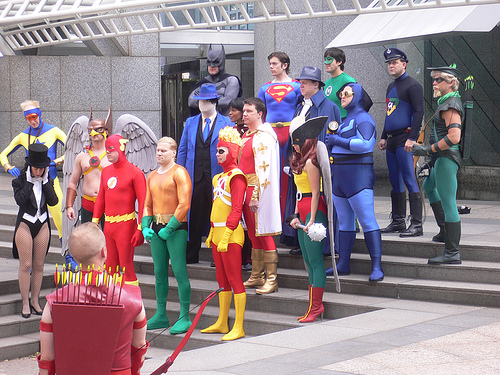I had the opportunity to see documentary
Wonder Women! The Untold Story of American Superheroines recently. The film provides a history of superheroines, beginning with Wonder Woman, overlaid with a history of women in American culture and women’s rights during the same decades. It was interesting to see Gloria Steinem talking about feminism, Ms. Magazine, and Wonder Woman in the same breath, and to see many women (and men)—some famous, some not—talk about the ways in which Wonder Woman has been an icon of female power and inspiration.
The film also includes what the director or interviewees see as the descendants of Wonder Woman in popular culture:The Bionic Woman, Ripley in the Alien films, Sara Conner ofTerminator, Xena, Buffy the Vampire Slayer, and evenCharlie’s Angels. Charlie’s Angels seems like a bit of a stretch, but the film makes a case for it.
More interesting psychologically are the parts of the film that talk about how icons in general, and superheroines in particular, inform us about what we should aspire to be. How they create templates to which we gravitate and fuel our imaginations, our self-images, and who we might want to become. Some of us may resonate with (or aspire to) Sara Conner’s tough, capable, and single-minded way of being strong. Others of us may resonate with Wonder Woman’s model of compassion, bravery, and strength. Or Buffy’s sense of
humor in the face of adversity. There is something for everyone in the pantheon of superheroines.
I wish the film had spent more time on the sexualization of superheroines. We all know that superheroines in comic books are drawn with marvelous figures in skimpy costumes, and film and TV superheroines as similarly endowed and attired. The film touched on the issue of superheroines always being sexy, and sexy being equated with power, but a longer discussion of the implications of this for the audience would have been welcome. For instance, what does it mean that superheroines sometimes use their attractive physical appearance to achieve their
goals? (Though Wonder Woman rarely does this, other superheroines do.) And what are the effects on females in the audience who see that superheroines only come in a certain size “package,” adorned a particular way. (For interesting research related to this in computer games, see Lissa Behm-Morawitz’s
research). What does it mean for women and men that superheroines are, by and large, also seen as
sex objects in our world? (Click
here for research about
objectification, in which the experience of being treated as an object results in coming to see oneself that way. Objectification theory was originally conceived of as primarily pertaining to females. The original article by Barbara Frederickson and Tomi-Ann Roberts in 1997.)
I suppose that’s the subject for another documentary.
Copyright 2013 by Robin S. Rosenberg


